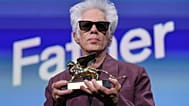There's a reason why the "Queen of Soul" was the first woman to be inducted into the Rock and Roll Hall of Fame.
 ADVERTISEMENT
ADVERTISEMENT
I first encountered Aretha Franklin in the pile of vinyl records my brother and sister left behind when they left for college. The Beatles’ “Revolver” caught my eye, but it was the stunning cover of “I Never Loved a Man the Way I Love You” that captivated me most of all. Peering out from it, Aretha Franklin looked amazing, but also intense — even a bit vulnerable. I put the record on and was transfixed. I didn’t know anything about Franklin, or her already epic career, or how being a “young, gifted and black" social activist had set her apart from the beginning. I didn’t even know the difference between R&B, soul music and rock and roll. I just knew I couldn’t get enough.
And so I played the title song over and over, much to the chagrin of my parents.
That song! But there was also “Respect,” the song by Otis Redding she’d fallen in love with and made her own. Then there was “Do Right Woman — Do Right Man” and “A Change Is Gonna Come,” the latter originally recorded by Sam Cooke, the man who had encouraged Franklin to pursue a career in popular music rather than the gospel she’d been raised on.
And that voice! The skill and attitude were undeniable. But it also seemed effortless and exposed all at the same time.
The undisputed "Queen of Soul," who died on Thursday in her beloved Detroit, was a once-in-a-lifetime talent. Her role in catapulting R&B and soul music into the mainstream is undeniable, as are contributions to the civil rights movement. But her career — with all its ups and down — perfectly tracks with the arc of the history of rock and roll.
There are many reasons to admire Aretha, but it’s worth pausing to reflect on how significant her impact was, and will always remain, on the genre she’s perhaps least associated with.
When we think about Franklin's contributions to rock, the music she and her contemporaries made in the late-1960s at FAME studios in Muscle Shoals, Alabama is a good place to start. “Those records were fearless, and hugely inspiring,” the English musician Paul Weller, who rose to fame as a member of the soul-inspired Jam, told me in 2015. “Motown records were great, but they were more pop. Those Muscle Shoals records had a harder edge. They were tough. They were soul music, but they were definitely rock and roll. They still sound fresh today, and they’re still the blueprint for a lot of what I do.”
Those records, the mark Franklin made with them and the deceptively powerful messages she conveyed to through them tracked the ascendance of the rock and roll genre. By the late 1960s, as Franklin’s star began its meteoric rise, her music could no longer be easily categorized as soul music. In fact, to do would have been a disservice to her vision.
“Respect” made Franklin a star — and became her signature song. But “(You Make Me Feel Like) A Natural Woman,” “Think,” “Chain of Fools” and “Spanish Harlem” all told similar stories of striving and yearning and fighting. These were songs as powerful as anything by Bob Dylan, or The Doors, or any of the other artists from that era who were making a living barring their souls. This was protest music of the highest order, and it in turn inspired musicians across the musical spectrum.
“I remember when [producer] Jerry Wexler called me to tell me that Aretha had recorded ‘The Weight,’ with Duane Allman, no less,” The Band’s Robbie Robertson told me, not long after learning of Franklin’s passing; he and his bandmates considered Franklin covering their signature song the highest of compliments. "We were a rag tag rock and roll band who had been hugely inspired by her music and her message... I remember telling the guys, and I remember the feeling of it really pushing us to work harder, almost as though we felt we still needed to earn that sort of honor.”
Over the next 50 years, Franklin climbed the pop and R&B charts again and again and again, ultimately earning 73 entries on the Billboard Hot 100. But it was her early albums — "I Never Loved a Man the Way I Love You," "Lady Soul," "Young, Gifted and Black" and "Amazing Grace" — that became part of the template for greatness for the next generation of rock and rollers. They may not often be catalogued together, but Franklin helped pave the way for such greats as Bruce Springsteen and the E Street Band and Tom Petty and the Heartbreakers.
“Aretha influenced everybody,” Benmont Tench, the Heartbreakers’ keyboardist told me. “Rock and roll, soul, jazz. There were so many lessons to be learned from Aretha: In rhythm, in control, in how and when to embellish the melody and, even more importantly, when not to. And in life: She stood up.”
“When the truly great ones pass — and Aretha was the best singer there was — the loss is more than just of that voice, that light, that vision, that sound,” Tench continued. “It is also of a way of thinking, of approaching both art and life.”
These were important lessons for rock and roll musicians and singer-songwriters, Tench said. For them, it wasn't enough to just make great records — these artists wanted to leave a legacy. With the loss of his friend and bandmate Tom Petty, last year — someone who clearly took Franklin's lessons to heart — the music world has lost two uncompromising guiding lights.
“She was the deal, simply the deal,” said Tench. “To say ‘was’ in the same sentence as ‘Aretha’ just tears the heart out of me.”
“Aretha Franklin was someone you could look up to, and look to for inspiration, even if you played rock and roll,” Robertson said. “She was larger than life, and just an amazing talent.”
Indeed, it’s no surprise that Franklin was the first woman to be inducted into the Rock and Roll Hall of Fame in 1987, part of only the second class of recipients. Because there’s no doubting that she belonged there, alongside the likes of Elvis and The Beatles and Chuck Berry and the Rolling Stones.
50 YEARS OF HITS
Like many contemporaries, the disco of the late-70s and the early days of MTV seemed to confound Franklin. Still, she never bowed to the whims of the charts or her label. She continued making records full of passion and attitude, in what should have been a lesson for every artist who attempted a crossover hit (though few heeded her example).
Soon, Franklin was back on the charts. Long before Paul McCartney, Eric Clapton or even her friend Stevie Wonder had reclaimed the audiences that largely abandoned them in the 1980s, Franklin was paving the way for the resurgence of what would come to be known as classic rock. By the 1990s, as her peers fruitlessly chased the charts, she was finding her footing as a legacy artist. She sang during the festivities surrounding President Bill Clinton’s inauguration in 1993, and the following year she received both a Grammy Lifetime Achievement Award and a Kennedy Center Honor.
She recorded the Rolling Stones’ “Jumping Jack Flash” — “Keith Richards insisted she play her own piano on the track, and Keith knows his piano players,” Tench recalled — and stepped in for an ailing Luciano Pavarotti at the Grammy Awards in 1998. “You know if Pavarotti wasn’t listening to Aretha already he never would have allowed it,” Tench said.
Fittingly, Franklin defied categorization in her later years, turning in an epic performance at President Barack Obama’s inauguration in 2009, and bringing him to tears at the Kennedy Center Honors tribute to Carole King in 2015. Along the way, she inspired modern artists as diverse as Lady Gaga and Beyoncé, Lorde and Courtney Barnett.
“There’s so much you can learn from a performer like Aretha Franklin,” Robbie Robertson said, as we wrapped up our conversation. “In fact, if you think about the arc of her career, it’s almost impossible not to be inspired, no matter what sort of music you’re making. She was just that good.”
Ultimately, Franklin was as much a part of rock and roll as anyone of her generation. And her music contributed just as much to the national dialogue as it did the pop charts.
She never worried about offending her audiences or, God forbid, the corporate heads or corporate sponsors. Aretha Franklin never bothered herself with such matters. She simply followed her heart down the path that felt righteous and true, and we’re all better for it.
Jeff Slate is a New York City-based songwriter and journalist. His writing can be found at sites like Esquire, Rolling Stone and Quartz, among others. He tweets at @jeffslate.
This article originally appeared on NBC News' Think. Opinions expressed in View articles do not reflect those of euronews.













